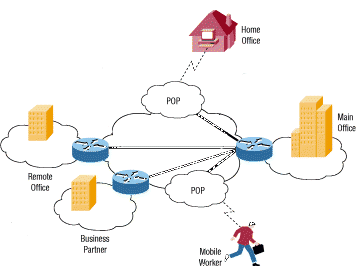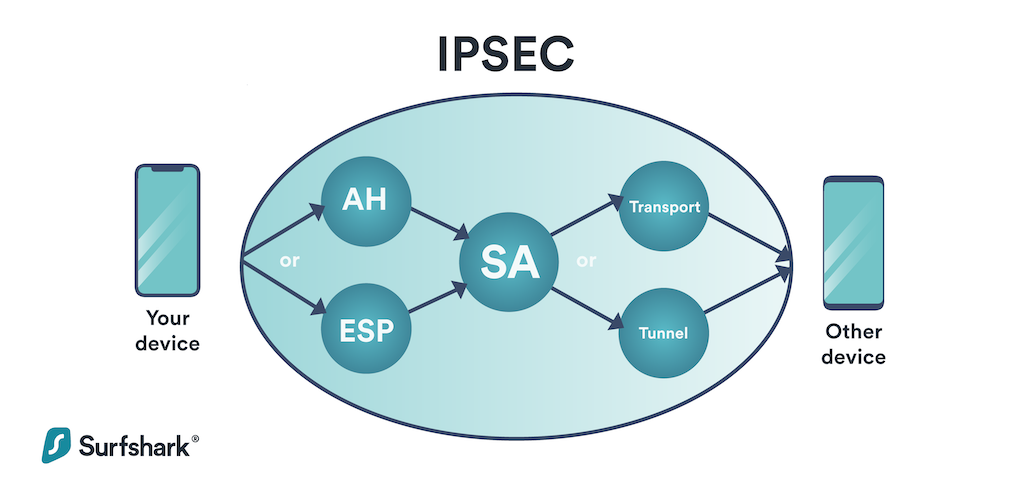Featured
Table of Contents
What Is Internet Protocol Security? Applications And Benefits
IPsec validates and secures information packets sent over both IPv4- and IPv6-based networks. IPsec protocol headers are found in the IP header of a package and specify how the information in a package is handled, including its routing and shipment across a network. IPsec includes numerous parts to the IP header, consisting of security information and one or more cryptographic algorithms.

ISAKMP is specified as part of the IKE protocol and RFC 7296. It is a framework for key establishment, authentication and negotiation of an SA for a safe and secure exchange of packages at the IP layer. In other words, ISAKMP defines the security specifications for how 2 systems, or hosts, interact with each other.
They are as follows: The IPsec process begins when a host system recognizes that a package needs protection and must be sent using IPsec policies. Such packets are thought about "interesting traffic" for IPsec functions, and they set off the security policies. For outgoing packages, this implies the proper encryption and authentication are used.
What Are Ipsec Policies?
In the second action, the hosts use IPsec to work out the set of policies they will use for a secured circuit. They also confirm themselves to each other and established a safe and secure channel in between them that is used to negotiate the way the IPsec circuit will secure or verify data sent across it.

After termination, the hosts get rid of the private secrets utilized during information transmission. A VPN basically is a private network implemented over a public network. Anyone who links to the VPN can access this personal network as if straight linked to it. VPNs are typically used in companies to allow staff members to access their business network from another location.
Normally used in between secured network entrances, IPsec tunnel mode makes it possible for hosts behind one of the gateways to interact safely with hosts behind the other entrance. Any users of systems in an enterprise branch workplace can securely link with any systems in the main office if the branch workplace and main office have safe entrances to act as IPsec proxies for hosts within the respective workplaces.
What Is Ipsec? Definition & Deep Dive
IPsec transport mode is utilized in cases where one host needs to connect with another host. The 2 hosts negotiate the IPsec circuit straight with each other, and the circuit is usually torn down after the session is total.
With an IPsec VPN, IP packages are secured as they travel to and from the IPsec entrance at the edge of a personal network and remote hosts and networks. An SSL VPN secures traffic as it moves between remote users and an SSL gateway. IPsec VPNs support all IP-based applications, while SSL VPNs only support browser-based applications, though they can support other applications with custom-made development.
See what is best for your organization and where one type works best over the other.
Internet Protocol Security Explained
Each IPsec endpoint verifies the identity of the other endpoint it desires to interact with, guaranteeing that network traffic and data are just sent to the designated and permitted endpoint. In spite of its great utility, IPsec has a couple of issues worth discussing. Direct end-to-end interaction (i. e., transmission technique) is not constantly offered.
The adoption of different local security regulations in large-scale dispersed systems or inter-domain settings may position extreme issues for end-to-end communication. In this example, presume that FW1 needs to examine traffic material to find invasions and that a policy is set at FW1 to reject all encrypted traffic so regarding enforce its content assessment requirements.
Users who use VPNs to remotely access a private organization network are put on the network itself, giving them the exact same rights and operational abilities as a user who is linking from within that network. An IPsec-based VPN might be produced in a range of ways, depending upon the requirements of the user.
How Ipsec Works, It's Components And Purpose
Due to the fact that these parts may originate from numerous providers, interoperability is a must. IPsec VPNs make it possible for smooth access to business network resources, and users do not always need to utilize web gain access to (gain access to can be non-web); it is therefore an option for applications that require to automate communication in both ways.
Its framework can support today's cryptographic algorithms along with more effective algorithms as they become offered in the future. IPsec is a mandatory component of Internet Protocol Variation 6 (IPv6), which companies are actively releasing within their networks, and is highly advised for Internet Procedure Variation 4 (IPv4) applications.
It supplies a transparent end-to-end secure channel for upper-layer procedures, and executions do not require modifications to those protocols or to applications. While having some disadvantages associated with its complexity, it is a mature procedure suite that supports a variety of encryption and hashing algorithms and is extremely scalable and interoperable.
What Are Ipsec Policies?
Like VPNs, there are numerous ways an Absolutely no Trust model can be executed, however services like Twingate make the procedure substantially simpler than needing to wrangle an IPsec VPN. Contact Twingate today to find out more.

IPsec isn't the most common internet security procedure you'll utilize today, but it still has a vital role to play in securing web communications. If you're using IPsec today, it's most likely in the context of a virtual private network, or VPN. As its name suggests, a VPN develops a network connection between 2 machines over the public web that's as protected (or practically as protected) as a connection within a personal internal network: most likely a VPN's many popular usage case is to enable remote workers to gain access to secured files behind a corporate firewall as if they were operating in the workplace.
For many of this short article, when we state VPN, we suggest an IPsec VPN, and over the next several areas, we'll discuss how they work. A note on: If you're wanting to establish your firewall program to permit an IPsec VPN connection, make certain to open UDP port 500 and IP ports 50 and 51.
Ipsec: A Comprehensive Guide - Techgenix

When this has actually all been set, the transportation layer hands off the information to the network layer, which is primarily managed by code working on the routers and other components that make up a network. These routers select the path private network packets take to their destination, however the transportation layer code at either end of the interaction chain does not need to understand those details.
On its own, IP does not have any integrated security, which, as we noted, is why IPsec was developed. Today, TLS is constructed into essentially all internet browsers and other internet-connected applications, and is more than enough defense for daily internet use.
That's why an IPsec VPN can include another layer of protection: it involves protecting the packages themselves. An IPsec VPN connection begins with facility of a Security Association (SA) in between two communicating computers, or hosts. In general, this involves the exchange of cryptographic keys that will allow the parties to encrypt and decrypt their interaction.
Latest Posts
Tech.co Guide - Is It Safe To Use A Vpn On A Phone?
The Best Vpn Services 2023
Best Free Vpn – Top 8 Free Vpns In August 2023